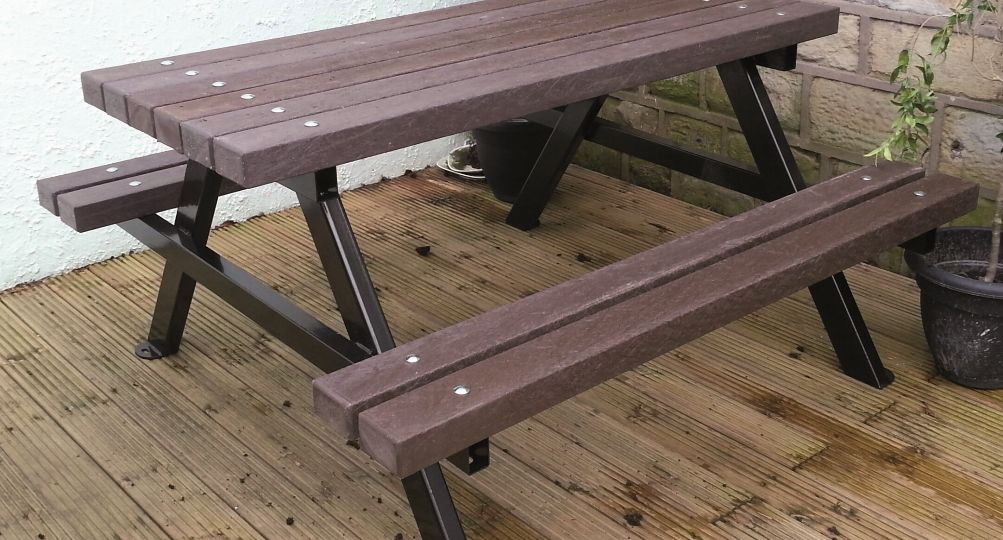
Introduction: The Challenge of Autumn Weather
In the UK, autumn brings cooler days, shorter evenings, and of course, plenty of rain. For anyone responsible for choosing outdoor furniture, whether in schools, parks, workplaces, or community spaces, the question is always the same: how do you find furniture that lasts in damp, unpredictable weather without becoming a maintenance burden?
Traditional materials like wood and metal have long been the standard, but they come with well-known drawbacks. Wood swells, cracks, and rots when soaked repeatedly. Metal, although sturdy, rusts and corrodes unless treated regularly. Both materials demand ongoing attention, which means added costs and time-consuming effort.
Recycled plastic furniture offers a refreshing alternative. It is durable, low-maintenance, and sustainable, performing exceptionally well in the UK’s autumn climate. Here’s how it stands up to weeks of rainfall and why it’s becoming the material of choice for organisations across the country.
1. Weatherproof by Design
Recycled plastic is non-porous, meaning it won’t absorb rainwater. Wooden benches and tables left outside often become waterlogged, losing shape or developing splits, especially in autumn when showers are frequent. Recycled plastic, by contrast, retains its structure no matter how long it’s exposed to wet conditions.
Frost is another challenge at the end of autumn. When absorbed water freezes inside wood, it expands and causes cracking. Recycled plastic avoids this problem entirely. Even as temperatures dip below zero, it doesn’t become brittle or lose strength. This makes it a safe and reliable option not just for autumn, but for the coldest winter months that follow.
2. Low-Maintenance and Hassle-Free
Wooden furniture requires seasonal upkeep, staining, sanding, and sealing, while metal often needs repainting or protective coatings to combat rust. These jobs add both time and cost, particularly for councils, schools, and businesses managing multiple outdoor areas.
Recycled plastic furniture, on the other hand, is virtually maintenance-free. A quick clean with warm water and soap is usually enough to remove mud, fallen leaves, or drink spills. There’s no need for specialised treatments or expensive products.
This ease of care means outdoor areas stay presentable with very little effort, which is especially valuable in autumn when wet weather can quickly leave spaces looking untidy.
3. Long-Term Durability
Another reason recycled plastic stands out is its impressive lifespan. While timber benches exposed to rain may need replacing every few years, recycled plastic furniture is designed to last for decades. Warranties of 10 to 20 years are common, and many products easily exceed that timeframe with minimal attention.
This durability is particularly important in public parks, school playgrounds, and smoking shelters, where furniture sees daily use. Even in challenging environments such as coastal towns, where salt air accelerates corrosion, recycled plastic continues to perform. Investing once provides long-term value without the need for frequent replacements.
4. Environmentally Sustainable
Recycled plastic furniture not only performs well, but also helps tackle the wider issue of plastic waste. Each bench, picnic table, or planter is created from post-consumer materials such as plastic bottles, food containers, and packaging.
By giving waste plastic a second life, these products divert it away from landfill or incineration, while also reducing the demand for new materials. For schools, this provides a great opportunity to teach pupils about recycling in action. For councils, it represents a responsible use of public funds. For businesses, it supports sustainability commitments and demonstrates genuine environmental care.
Choosing recycled plastic is more than a practical decision; it’s a step towards reducing the environmental footprint of outdoor spaces.
5. Safe and Comfortable
Safety is critical when choosing outdoor furniture. Wooden benches can splinter when exposed to damp weather, and untreated metal can develop sharp, rusty edges. Both can pose risks, especially to children.
Recycled plastic avoids these problems. Its surfaces remain smooth, splinter-free, and resistant to mould and algae growth. Unlike metal, it doesn’t become icy cold or slippery in wet weather, making it safer and more comfortable to use throughout autumn.
This makes it particularly suitable for schools, healthcare settings, and public areas where furniture is used daily by a wide range of people.
6. Versatility in Design
Modern recycled plastic furniture has moved far beyond the basic, functional look it once had. Today, it comes in a wide range of designs, finishes, and colours. From traditional wooden-style slats to bold, contemporary tones, it can fit seamlessly into different environments.
Examples include:
- Schools: Brightly coloured tables and benches that make playgrounds more inviting.
- Public parks: Classic designs that blend naturally into green spaces.
- Workplaces: Smart, professional seating for staff courtyards or smoking shelters.
- Gardens and residential areas: Stylish, weatherproof options that maintain their appearance year-round.
Autumn weather does nothing to dull these options. Recycled plastic maintains its colour and finish far longer than timber or painted alternatives.
7. Resistant to Wear and Tear
Rain is just one of autumn’s challenges. Fallen leaves, mud, and even vandalism can leave outdoor furniture looking worn. Recycled plastic is resistant to staining and less prone to graffiti damage. If graffiti does occur, it can often be removed more easily than from timber or painted metal.
In busy public areas, the furniture continues to look neat even after heavy daily use. Unlike wood, it won’t peel or flake, and it doesn’t harbour pests, making it more hygienic over time.
8. Cost-Effective in the Long Run
While recycled plastic furniture may be more expensive initially than some wooden or metal alternatives, the savings over time are significant. Its long lifespan means fewer replacements, while its minimal maintenance cuts down on labour and product costs.
For councils, this means budgets can be stretched further. For schools and businesses, it avoids the hassle of constant upkeep and replacement cycles. Over a decade or more, the investment pays for itself many times over.
9. Supporting Outdoor Life
Reliable outdoor furniture does more than withstand the weather; it encourages people to use the spaces around them. In schools, outdoor classrooms equipped with durable furniture can remain active further into the autumn term. Parks and playgrounds remain welcoming places for communities, even after weeks of rain. Businesses can provide staff with outdoor break areas that stay safe and comfortable in damp conditions.
By installing recycled plastic seating, organisations make it easier for people to enjoy the outdoors all year round, improving wellbeing and social interaction.
10. Real World Autumn Applications
- Schools and nurseries: Wipe-clean tables allow lessons and lunchtime outdoors without worrying about damage from rain.
- Community parks: Benches and picnic sets stay usable and welcoming, avoiding the weather-beaten look of timber alternatives.
- Smoking shelters: Companies can provide clean, professional seating that won’t rot or corrode.
- Residential gardens: Property managers maintain attractive shared spaces that don’t require ongoing maintenance.
- Sports clubs and community centres: Furniture continues to look smart despite heavy use and exposure to autumn mud.
These examples show that recycled plastic is more than just functional; it helps create better outdoor environments that withstand the season.
Conclusion: Ready for Autumn and Beyond
Autumn rain is a fact of life in the UK, but constant repairs and replacements don’t have to be. Recycled plastic furniture provides a practical, sustainable, and long-lasting solution to the problems that wood and metal face.
It resists water, avoids rot and rust, stays safe and splinter-free, and requires almost no maintenance. At the same time, it supports sustainability goals by repurposing waste plastic and reducing environmental impact.
For schools, parks, councils, businesses, and gardens, recycled plastic furniture is the smart investment built to withstand autumn’s downpours and ready for every season that follows. Choosing it is not only about durability but also about creating spaces that are safer, greener, and more enjoyable for everyone.
Explore our collection today and see how recycled plastic furniture can transform your outdoor space https://tamstar.co.uk/category/recycled-products/recycled-plastic-furniture/
